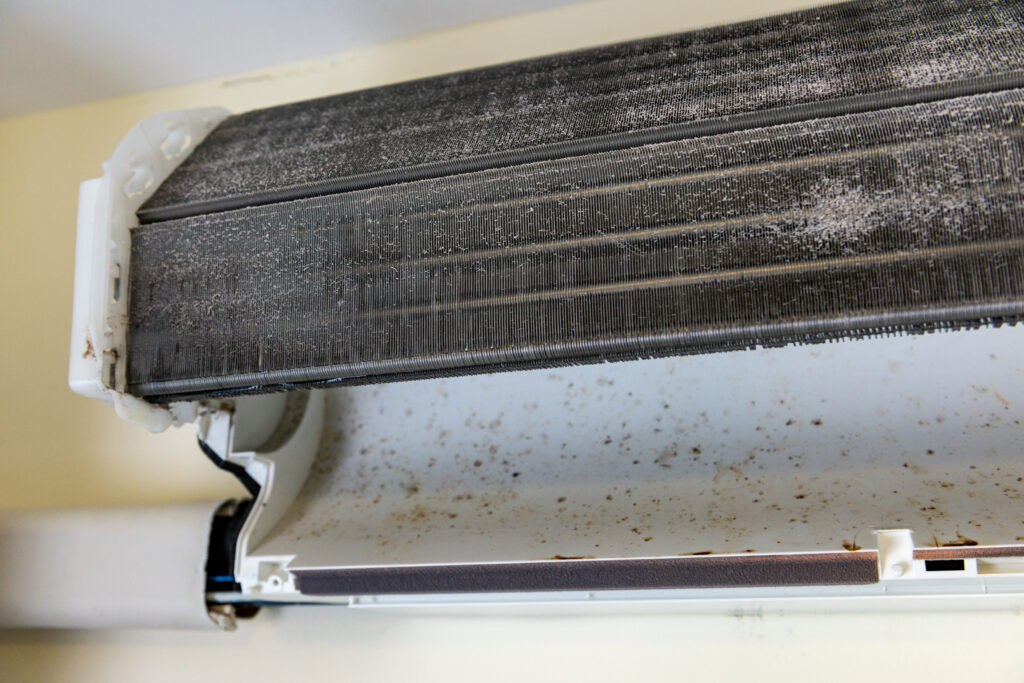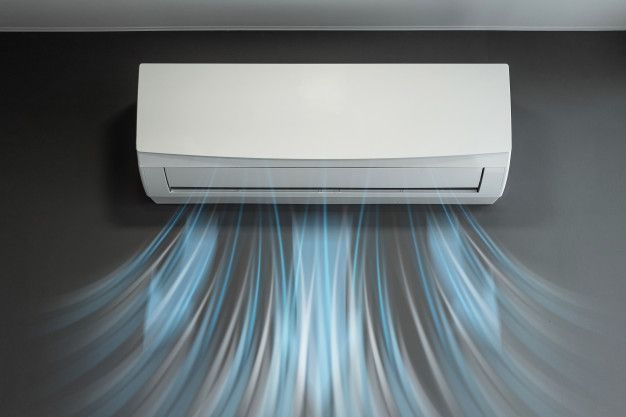here’s nothing worse than walking into your home on a hot, humid day only to realize that your air conditioner isn’t cooling the way it should. Whether you’re facing warm air blowing from the vents or just a general lack of cooling, a malfunctioning aircon can be frustrating, especially in a tropical climate like Singapore. Understanding the potential causes of your aircon’s lack of cooling is key to finding a solution.
Today, we’ll explain when it’s best to call a professional technician for help and how regular maintenance can keep your aircon running at its best.
1. Dirty or Clogged Air Filters
One of the most common reasons for poor cooling is dirty or clogged air filters. Air filters trap dust, dirt, and debris but can become clogged over time and restrict airflow. When airflow is reduced, your aircon struggles to cool the room efficiently.
What You Can Do:
- Turn off the unit before cleaning the filter.
- Remove the filter, clean it gently with a vacuum or wash it with warm water and mild soap. Be sure to dry it completely before reinserting it into the aircon.
- Consider replacing the filter if it appears too worn or damaged.
Why It’s Important: A clogged filter reduces cooling efficiency and can cause the system to work harder, leading to higher energy bills and increased wear and tear on your aircon.
2. Low Refrigerant Levels
Refrigerant is the substance responsible for cooling the air in your aircon unit. If your refrigerant levels are low, it can significantly impact the cooling performance. This is often caused by a leak in the system, which can occur over time due to normal wear and tear or poor maintenance.
What You Can Do:
- Check for visible ice buildup around the evaporator coils or refrigerant lines. This could indicate a refrigerant leak.
- Call a technician to inspect the system and refill the refrigerant, as handling refrigerants requires proper training and safety measures.
Why It’s Important: Low refrigerant levels can prevent your aircon from cooling the room properly. If left unchecked, it could cause more damage to the compressor and other parts, leading to expensive repairs.
3. Thermostat Issues
If your aircon is blowing but the room still feels warm, the issue may lie with the thermostat. A malfunctioning thermostat can send incorrect signals to the aircon, causing it to fail to maintain the right temperature. Sometimes, the thermostat may be set incorrectly, leading to confusion about why the aircon isn’t cooling.
What You Can Do:
- Check the thermostat settings to ensure they are set to the correct temperature and cooling mode.
- If the temperature is set correctly but the aircon is still not cooling, calibrate the thermostat (if possible) or replace the batteries if it’s a digital model.
- If the problem persists, call a professional to inspect and calibrate the thermostat.
Why It’s Important: A faulty thermostat can prevent your aircon from cooling properly, and replacing or repairing it may restore normal cooling function.
4. Blocked or Dirty Coils
The evaporator and condenser coils are crucial parts of the aircon that allow heat exchange. Over time, these coils can become clogged with dirt, dust, and debris. If the coils are dirty, they can’t absorb or release heat efficiently, which prevents the aircon from cooling properly.
What You Can Do:
- Turn off the aircon and inspect the evaporator and condenser coils for dirt or buildup.
- Use a vacuum with a brush attachment to gently remove debris from the coils.
- If the coils are heavily dirty or damaged, hiring a professional to clean or replace them is best.
Why It’s Important: Dirty coils can strain the system, reduce cooling efficiency, and even cause the aircon to overheat. Regular coil cleaning and maintenance can prevent these issues and help your aircon function optimally.
5. Blocked or Leaking Ducts
If your aircon is blowing cool air but doesn’t seem to be circulating throughout the room, the issue could be with the ducts. Leaking ducts or blocked vents prevent the cool air from reaching all room areas, making it feel warmer.
What You Can Do:
- Check the vents and ductwork for any visible blockages or damage. Blocked vents can be cleared by removing obstructions like furniture or dust.
- Seal any leaks in the ducts with duct tape or professional sealing products.
- If you suspect significant duct issues, contact a professional to inspect and repair the ductwork.
Why It’s Important: Leaky or blocked ducts can reduce airflow and make aircon less efficient. Properly sealed and unblocked ducts will allow cool air to circulate more effectively throughout your home.

6. Faulty Compressor
The compressor is the heart of your aircon and is responsible for circulating refrigerant through the system. If the compressor malfunctions, the unit will struggle to cool the air effectively, even if other components work fine.
What You Can Do:
- Listen for unusual sounds from the compressor. It may be time to call a professional if it’s making a loud noise or not running.
- Avoid DIY repairs, as fixing or replacing a compressor requires technical expertise.
Why It’s Important: A faulty compressor can lead to total system failure if not addressed. Professional repair or replacement is usually necessary to restore your aircon’s cooling power.
7. Insufficient Airflow from Vents
Weak or insufficient airflow is another common issue that impacts the cooling performance of your aircon. When airflow is restricted, the unit can’t circulate cool air effectively, leading to uneven cooling or a failure to cool the room.
What You Can Do:
- Check the air filters for clogs and clean or replace them as needed.
- Inspect the vents to ensure they are not obstructed by furniture or debris.
- If airflow issues persist, check the blower fan and ducts for blockages.
Why It’s Important: Poor airflow reduces the efficiency of your aircon and can make it difficult to maintain a comfortable indoor temperature. Regularly cleaning filters and ensuring vents are unblocked will improve performance.
8. Water Leaks from the Aircon
Water leaks are a common issue, particularly in older aircon units. Leaks often happen because of a clogged drain line, which prevents the condensation from draining out correctly, or because of frozen coils that thaw and drip water.
What You Can Do:
- Check the drain line and clear any clogs. Flush the drain line with warm water and a mild detergent if necessary.
- If the issue persists, it may be a problem with the evaporator coils, and you’ll need to call a professional.
Why It’s Important: Water leaks can lead to water damage on your floors and walls. Addressing the problem quickly will prevent damage and maintain the efficiency of your aircon system.
9. Inadequate Refrigerant Levels
Low refrigerant levels are a common cause of poor cooling. Refrigerant is essential for the cooling process, and if your aircon is low on refrigerant, it will fail to cool effectively.
What You Can Do:
- Call a professional technician to check and refill the refrigerant levels. This is not a DIY task, as refrigerant handling requires certification.
Why It’s Important: Low refrigerant can result in poor cooling and, if left unchecked, could cause damage to your aircon’s compressor. Having it recharged by a professional ensures it works efficiently.
10. Age of the Aircon Unit
If your aircon is over 10 years old, it might not perform as efficiently as newer models. As aircons age, they lose their ability to cool effectively, even with regular maintenance.
What You Can Do:
- Consider replacing the unit if it’s over 10 years old and has frequent issues. Newer units are more energy-efficient and can provide better cooling.
Why It’s Important: Replacing an old aircon can lead to better energy savings and more reliable performance. Older units are also more likely to experience issues that are costly to repair.
Final Thoughts
If your aircon isn’t cooling properly, acting quickly before the problem worsens is essential. Whether it’s a dirty filter, a refrigerant leak, or a faulty compressor, these issues can all contribute to poor cooling performance. While some problems can be addressed through basic maintenance, others require professional attention.
If you notice any unusual noises or foul smells, or if your aircon isn’t performing efficiently, it’s best to call a professional to inspect and repair your unit. Regular maintenance and timely repairs will ensure that your aircon continues to provide cool, refreshing air, even during the hottest months.



You must be logged in to post a comment.